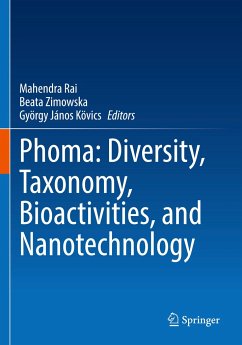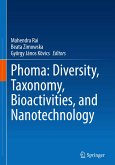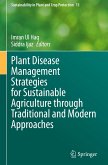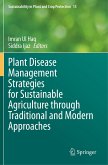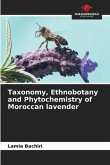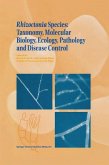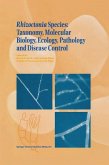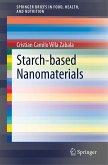Phoma: Diversity, Taxonomy, Bioactivities, and Nanotechnology
Herausgegeben:Rai, Mahendra; Zimowska, Beata; Kövics, György János
Phoma: Diversity, Taxonomy, Bioactivities, and Nanotechnology
Herausgegeben:Rai, Mahendra; Zimowska, Beata; Kövics, György János
- Broschiertes Buch
- Merkliste
- Auf die Merkliste
- Bewerten Bewerten
- Teilen
- Produkt teilen
- Produkterinnerung
- Produkterinnerung
The book covers the taxonomy, diversity, bioactivity, and nanotechnology involved in the study of the genus Phoma . It presents the most recent molecular taxonomic approach, secondary metabolites, different bioactivities, combating microbial threats, and its use in nanotechnology from a basic research to an applied perspective. Expert contributors provide the latest research and applications to present thorough coverage of this important genus in human and plant pathology and the disease management.
Andere Kunden interessierten sich auch für
![Phoma: Diversity, Taxonomy, Bioactivities, and Nanotechnology Phoma: Diversity, Taxonomy, Bioactivities, and Nanotechnology]() Phoma: Diversity, Taxonomy, Bioactivities, and Nanotechnology117,99 €
Phoma: Diversity, Taxonomy, Bioactivities, and Nanotechnology117,99 €![Plant Disease Management Strategies for Sustainable Agriculture through Traditional and Modern Approaches Plant Disease Management Strategies for Sustainable Agriculture through Traditional and Modern Approaches]() Plant Disease Management Strategies for Sustainable Agriculture through Traditional and Modern Approaches110,99 €
Plant Disease Management Strategies for Sustainable Agriculture through Traditional and Modern Approaches110,99 €![Plant Disease Management Strategies for Sustainable Agriculture through Traditional and Modern Approaches Plant Disease Management Strategies for Sustainable Agriculture through Traditional and Modern Approaches]() Plant Disease Management Strategies for Sustainable Agriculture through Traditional and Modern Approaches81,99 €
Plant Disease Management Strategies for Sustainable Agriculture through Traditional and Modern Approaches81,99 €![Taxonomy, Ethnobotany and Phytochemistry of Moroccan lavender Taxonomy, Ethnobotany and Phytochemistry of Moroccan lavender]() Lamia BachiriTaxonomy, Ethnobotany and Phytochemistry of Moroccan lavender26,99 €
Lamia BachiriTaxonomy, Ethnobotany and Phytochemistry of Moroccan lavender26,99 €![Rhizoctonia Species: Taxonomy, Molecular Biology, Ecology, Pathology and Disease Control Rhizoctonia Species: Taxonomy, Molecular Biology, Ecology, Pathology and Disease Control]() Rhizoctonia Species: Taxonomy, Molecular Biology, Ecology, Pathology and Disease Control154,99 €
Rhizoctonia Species: Taxonomy, Molecular Biology, Ecology, Pathology and Disease Control154,99 €![Rhizoctonia Species: Taxonomy, Molecular Biology, Ecology, Pathology and Disease Control Rhizoctonia Species: Taxonomy, Molecular Biology, Ecology, Pathology and Disease Control]() B. Sneh / S. Jabaji-Hare / S.M. Neate / G. Dijst (Hgg.)Rhizoctonia Species: Taxonomy, Molecular Biology, Ecology, Pathology and Disease Control156,99 €
B. Sneh / S. Jabaji-Hare / S.M. Neate / G. Dijst (Hgg.)Rhizoctonia Species: Taxonomy, Molecular Biology, Ecology, Pathology and Disease Control156,99 €![Starch-based Nanomaterials Starch-based Nanomaterials]() Cristian Camilo Villa ZabalaStarch-based Nanomaterials39,99 €
Cristian Camilo Villa ZabalaStarch-based Nanomaterials39,99 €-
-
-
The book covers the taxonomy, diversity, bioactivity, and nanotechnology involved in the study of the genus Phoma. It presents the most recent molecular taxonomic approach, secondary metabolites, different bioactivities, combating microbial threats, and its use in nanotechnology from a basic research to an applied perspective. Expert contributors provide the latest research and applications to present thorough coverage of this important genus in human and plant pathology and the disease management.
Produktdetails
- Produktdetails
- Verlag: Springer / Springer International Publishing / Springer, Berlin
- Artikelnr. des Verlages: 978-3-030-81220-1
- 1st ed. 2022
- Seitenzahl: 360
- Erscheinungstermin: 21. November 2022
- Englisch
- Abmessung: 254mm x 178mm x 20mm
- Gewicht: 677g
- ISBN-13: 9783030812201
- ISBN-10: 3030812200
- Artikelnr.: 66233298
- Verlag: Springer / Springer International Publishing / Springer, Berlin
- Artikelnr. des Verlages: 978-3-030-81220-1
- 1st ed. 2022
- Seitenzahl: 360
- Erscheinungstermin: 21. November 2022
- Englisch
- Abmessung: 254mm x 178mm x 20mm
- Gewicht: 677g
- ISBN-13: 9783030812201
- ISBN-10: 3030812200
- Artikelnr.: 66233298
Mahendra Rai is a Senior Professor and UGC- Basic Science Research Faculty Fellow at the Department of Biotechnology, Sant Gadge Baba Amravati University at Amravati, Maharashtra, India. He was a Visiting Scientist at the following institutions and universities: Department of Bioenergetics, University of Geneva, Switzerland and at the Department of Plant Protection of Debrecen University, Debrecen, Hungary . Institute of Chemistry, University of Campinas, Brazil under Indo-Brazil Research Programme (DST-CNPq collaboration). Professor in Nicolaus Copernicus University, Torun, Poland, State University of Campinas, Brazil, Ostrava, Czech Republic and in National University of Rosario, Argentina. His areas of expertise include microbial biotechnology and nanobiotechnology. Moreover, he studied different aspects of Phoma extensively. His present research interest include application of nanobiotechnology in medicine with particular reference to the development of nanoantimicrobials. He has published more than 400 research papers in national and international journals. In addition, he has edited/authored more than 60 books and 6 patents. Beata Zimowska is Associate Professor, at the Department of Plant Pathology, Subdepartment Phytopathology and Mycology, Faculty of Horticulture and Land Scape, University of Life Sciences in Lublin, Poland. She has published more than 60 research papers, 30 popular articles in Polish and abroad. She is a member of several scientific societies. She has won several awards: grade I team from HM Rector the Academy of Agriculture in Lublin -2000, grade II team from HM Rector the University of Life Sciences in Lublin -2009, individual grade I from HM Rector the University of Life Sciences for scientific activity in the years 2010-2012 -2014, individual grade II from HM Rector the University of Life Sciences for scientific activity in the years 2014-2016 -2017. She was co-organizer and member of ScientificBoard 1st Eurasian Mycological Congress 3-5.07.2016, Manisa, Turkey and XIII Congress of Ecology and Environment with International Participation 12-15.09.2017, Edirne, Turkey. Since 2014 she cooperates with Bulgarian Institute of Genetics in Sofia, since 2015 with Department of Agriculture, University of Naples Federico II, Portici and Institute for Sustainable Plant Protection (IPSP)/ National Research Council (CNR)Portici, Italy, since 2015 with Department of Biology Trakya University, Edirne, Turkey. Presently her research activities are aimed at: Phoma sensu lato group of fungi, endophytic fungi, fungal symbiont and their relationships with gall midges, mutualistic interactions between the gall causing species of dipterans from Asphondylia genus (Diptera: Cecidomyiidae) and on fungi developing in the inner wall of galls, etiology and epidemiology of infectious diseases of MAPs (medicinal and aromatic plants), with special regards of new and emerging infectious diseases (EIDs). György J. Kövics is professor emeritus of plant pathology at the Institute of Plant Protection, University of Debrecen, Hungary. After some years of research experience, his university career has been started in 1989 and during the last 3 decades he taught plant pathology. He has published more than 310 scientific publications, including 28 books and book chapters. He started the Scientific Trans-Tisza National Conference of Plant Protection in 1996, which includes International Plant Protection Symposia (IPPS). He was visiting professor at the University of Reading, UK (1993), Wageningen University, the Netherlands (1994), Mysore University, and Amravati University, India (2004). Prof Kövics serves as a referee for about 15 international journals and is a member of editorial boards of numerous national and international journals. He was awareded "Pro re rustica promovenda" medal for the development of agriculture (1997), "Pro Universitate etScientia" medal of the World Council of Hungarian Professors (2005), "György Linhart medal" recognition of plant pathologists (2006), Eminent Plant Doctor of Hungarian Plant Doctors' Chamber (2014). Prof Kövics is engaged in mycotaxonomy and research on the biology of recently emerged and spreading plant pathogens.
Part 1-General Identity and Taxonomy.- Phoma: An Overview.- Phoma Diseases-Identification, Epidemiology and Management.- Taxonomical Evaluation of Phoma-History of Classification, Current Status and Future Directions.- Part 2-Diversity, Diseases and Host Range.- Biodiversity of the Genus Phoma in Different Habitats.- Phoma on Medicinal and Aromatic Plants.- Types of Plant Diseases Caused by Phoma Species and Their Integrated Management.- Plant Pathogenic Phoma Species: Host Range, Symptoms and Distribution.- Overview of Phoma-like Fungi on Legumes: Papilionaceous plants): Pea, Beans, Soybean, Chickpea and Faba Beans.- Vegetable Diseases Caused by Phoma SSP.- Part 3: Phoma Spp. as a Human Pathogen.- Phoma as an Infectious Pathogen in Medical Practice.- Part 4- Bioactivities and Nanotechnology.- Genus Phoma; A Review of Its Potential Bioactivities, Implications and Prospects.- Bioherbicidal Activity of Phoma macrostoma.- Fruitful Decade for Phoma Secondary Metabolites From 2011 to 2020: Chemistry, Chemical Diversity and Biological Activities.- Plant Growth Promoting Phoma spp..- Biological Management of Plant Diseases by Non-Pathogenic Phoma spp..- Endophytic Phoma: Potentials and Limitations.- Bioactive Secondary Metabolites of Endophytic Phoma: Biochemistry and Signifigance.- Exploitation of Phoma for Fabrication of Silver Nanoparticles.
Part 1-General Identity and Taxonomy.- Phoma: An Overview.- Phoma Diseases-Identification, Epidemiology and Management.- Taxonomical Evaluation of Phoma-History of Classification, Current Status and Future Directions.- Part 2-Diversity, Diseases and Host Range.- Biodiversity of the Genus Phoma in Different Habitats.- Phoma on Medicinal and Aromatic Plants.- Types of Plant Diseases Caused by Phoma Species and Their Integrated Management.- Plant Pathogenic Phoma Species: Host Range, Symptoms and Distribution.- Overview of Phoma-like Fungi on Legumes: Papilionaceous plants): Pea, Beans, Soybean, Chickpea and Faba Beans.- Vegetable Diseases Caused by Phoma SSP.- Part 3: Phoma Spp. as a Human Pathogen.- Phoma as an Infectious Pathogen in Medical Practice.- Part 4- Bioactivities and Nanotechnology.- Genus Phoma; A Review of Its Potential Bioactivities, Implications and Prospects.- Bioherbicidal Activity of Phoma macrostoma.- Fruitful Decade for Phoma Secondary Metabolites From 2011 to 2020: Chemistry, Chemical Diversity and Biological Activities.- Plant Growth Promoting Phoma spp..- Biological Management of Plant Diseases by Non-Pathogenic Phoma spp..- Endophytic Phoma: Potentials and Limitations.- Bioactive Secondary Metabolites of Endophytic Phoma: Biochemistry and Signifigance.- Exploitation of Phoma for Fabrication of Silver Nanoparticles.

